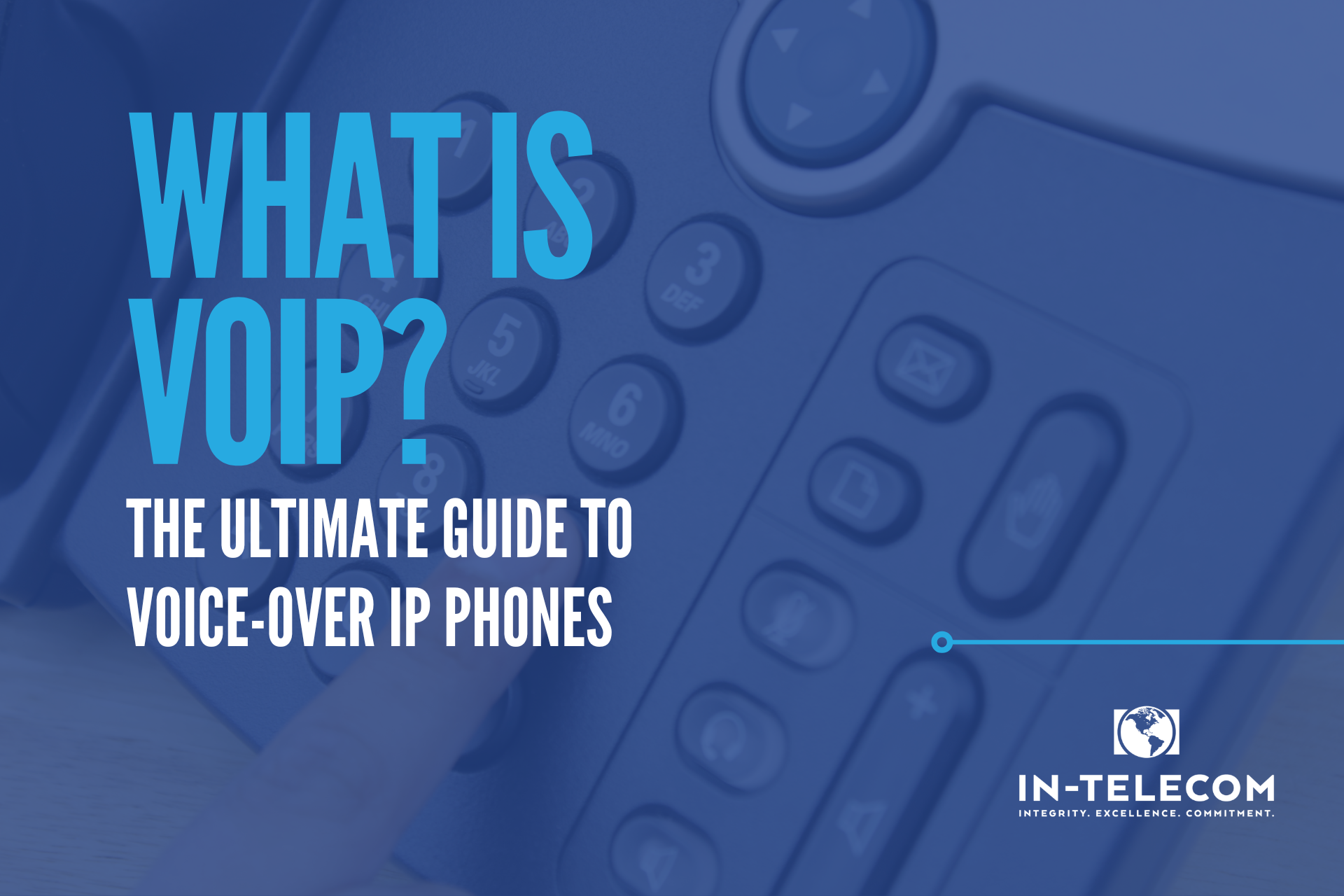
Voice-over-IP (VoIP) phone systems are a modern and innovative solution for business communication that allows voice calls to be transmitted over an internet connection. Unlike traditional phone lines, which rely on a publicly switched telephone network (PSTN), VoIP leverages the power of the internet to provide cost-effective and flexible communication for businesses of all sizes.
What is a VoIP Phone System?
The term “VoIP” refers to transmitting voice signals over a data network, typically the internet, using the Internet Protocol (IP). This allows for voice calls to be made using a broadband connection, such as a fiber-optic cable, rather than through traditional phone lines.
Voice over internet protocol has revolutionized how businesses communicate and has become a popular choice for organizations seeking a cost-effective and feature-rich phone system. It provides many advanced features and functionalities, including virtual meetings and video conferencing, call forwarding and voicemail, and integration with other business systems and software.
Table of Contents
VoIP phone systems offer significant cost savings and improved communication capabilities compared to traditional phone lines. With Voice-over-IP, there is no need to pay for additional phone lines or long-distance charges, and there are often fewer maintenance and support costs. Additionally, VoIP phone systems can be easily scaled to meet the changing needs of a business, making it a flexible and scalable solution for businesses of all sizes.
How Does a Voice-over-IP Phone System Work?
Transmitting voice over an IP network, or Voice over internet protocol requires several key components to function effectively. These components include IP phones, a router, and a network infrastructure that connects the devices and enables data flow.
When making a call using a Voice over internet protocol phone system, the user speaks into the IP phone, which converts the analog voice signal into digital data. This data is then compressed, encoded, and sent over the internet to the recipient. The recipient’s IP phone then decodes the data, decompresses it, and converts it back into an analog signal that can be heard through the phone’s speaker.
One of the critical considerations for Voice-over-IP is ensuring that the quality of the voice transmission is maintained during this process. This is achieved through Quality of Service (QoS) considerations, prioritizing voice data over other types of data transmitted over the network. This helps to minimize delay, jitter, and other factors that can negatively impact the quality of the call.
Additionally, the network infrastructure must be configured to support Voice-over-IP traffic and meet the necessary bandwidth requirements. This includes ensuring that the network is secure and that firewalls and other security measures are in place to protect against hacking and other security threats.
Voice over internet protocol works by converting analog voice signals into digital data, encoding and compressing this data, and transmitting it over an IP network to the recipient. It is then decoded, decompressed, and converted into an analog signal., ensuring that the quality of the voice transmission is a critical aspect of the process. The network infrastructure must be configured to support Voice-over-IP traffic and meet bandwidth requirements.
The Advantages of VoIP Phone Systems
There are many advantages to using a Voice-over-IP phone system, including cost savings, increased flexibility and mobility, and advanced features and functionalities. Some of the most notable benefits include:
Cost Savings
One of the primary advantages of VoIP is cost savings. Voice-over-IP eliminates the need for additional phone lines and long-distance charges, and there are often fewer maintenance and support costs than traditional phone lines.
Flexibility and Mobility
Voice-over-IP phone systems provide flexibility and mobility that traditional phone lines cannot match. With VoIP, employees can make and receive calls from anywhere with a broadband connection, allowing for increased productivity and the ability to work from anywhere.
Advanced Features and Functionalities
VoIP phone systems offer a range of advanced features and functionalities that traditional phone lines cannot match, including virtual meetings and video conferencing, call forwarding and voicemail, and integration with other business systems and software.
Scalability
Voice-over-IP phone systems are easily scalable to meet the changing needs of a business, making it a flexible and scalable solution for businesses of all sizes. This allows companies to add or remove users and lines as needed without investing in new equipment or incurring additional costs.
Improved Communication:
VoIP provides enhanced communication capabilities compared to traditional phone lines, with higher-quality voice transmission and the ability to transmit data and multimedia content in real time.
Voice-over-IP phone systems offer many advantages over traditional phone lines, including cost savings, increased flexibility and mobility, advanced features and functionalities, scalability, and improved communication capabilities. These advantages make it an attractive option for businesses seeking a cost-effective and feature-rich phone system.
Popular Features of VoIP Phone Systems
VoIP phone systems offer a range of advanced features and functionalities designed to enhance the user experience and improve communication and collaboration. Some of the most popular features include:
- Virtual Meetings and Video Conferencing: Systems often include virtual meeting and video conferencing capabilities, allowing users to participate in virtual meetings and presentations from anywhere with a broadband connection.
- Call Forwarding and Voicemail: Call forwarding and voicemail features allow users to redirect incoming calls to another number or receive messages when they cannot answer the phone.
- Auto Attendant: Auto attendant features allow for an automated voice response system, directing callers to the appropriate department or individual based on the caller’s needs.
- Integration with Other Business Systems and Software: VoIP systems can be integrated with other business systems and software, such as CRM, ERP, and productivity tools, to streamline workflows and improve productivity.
- Mobile Integration: VoIP systems often provide mobile integration, allowing users to make and receive calls on their mobile devices as if they were at their desks.
- IVR (Interactive Voice Response): IVR systems allow for automated call handling, providing callers with options for self-service or directing them to the appropriate department or individual.
- Call Management and Analytics: VoIP systems provide detailed call management and analytics, allowing administrators to monitor call volume, call quality, and other essential metrics and make data-driven decisions to improve the performance of the phone system.
Voice-over-IP phone systems offer a range of popular features and functionalities, including virtual meetings and video conferencing, call forwarding and voicemail, auto attendant, integration with other business systems and software, mobile integration, IVR, and contact management and analytics. These features are designed to enhance the user experience, improve communication and collaboration, and streamline workflows.
Average Costs of VoIP Service
The cost of Voice-over-IP service varies depending on the type of service, the number of lines, and the features and functionalities required. On average, businesses can expect to pay between $20 and $50 per user per month for a basic VoIP service, with additional costs for advanced features and functionalities.
It is crucial to keep in mind that while the upfront costs of a VoIP system may be higher than a traditional phone line, the long-term cost savings and improved functionality can make it a cost-effective option for many businesses.
Additionally, the costs associated with VoIP can be reduced by leveraging existing broadband connections, using software-based phones, and using cloud-based services, which can eliminate the need for on-premise hardware and infrastructure.
Equipment Needed for a VoIP System
To set up a Voice-over-IP phone system, businesses will need the following equipment:
- High-speed Internet connection: A high-speed broadband internet connection is required to use Voice-over-IP services. A minimum of 1 Mbps upload and download speed is recommended for optimal performance.
- IP Phones: IP phones, also known as VoIP phones, are specialized telephones designed for use with VoIP systems. These phones can be hardware-based or software-based, depending on the needs of the business.
- Router: A router is needed to connect the IP phones and other devices to the broadband internet connection.
- PBX (Private Branch Exchange) System: A PBX system is the central hub of a VoIP system, responsible for routing and managing calls. This can be a hardware-based PBX system or a cloud-based virtual PBX system, depending on the needs of the business.
- Headset: A headset may be required for employees who need hands-free communication while working on a computer.
To set up a VoIP system, businesses will need a high-speed internet connection, IP phones, a router, a PBX system, and a headset (optional). These components are essential for a fully functional VoIP system that can improve business communication and collaboration.
Frequently Asked Questions About VoIP Service
What is the difference between VoIP and traditional phone lines?
Voice-over-IP is a digital communication technology that uses the internet to make and receive phone calls, while traditional phone lines use circuit-switched technology. VoIP is often less expensive, offers more advanced features and functionalities, and provides greater call routing and management flexibility compared to traditional phone lines.
How does Voice-over-IP work?
Voice-over-IP works by converting analog voice signals into digital data packets and transmitting them over the internet to reach their destination. The data packets are reconverted into analog voice signals at the receiving end and delivered to the recipient.
Are there any downsides to using VoIP?
While Voice-over-IP offers many benefits, there are a few downsides to consider. For example, a reliable and fast internet connection is required for optimal performance, and call quality can be affected by network congestion or slow internet speeds. Additionally, in the event of a power outage, VoIP service may only be available if a backup power source is in place.
Is Voice-over-IP secure?
Security is a concern for many businesses. Choosing a provider with robust security measures, such as encryption and firewalls, is vital to protect sensitive data and communications.
These are some of the most frequently asked questions about VoIP service. VoIP is a digital communication technology that offers many benefits over traditional phone lines, including lower costs, advanced features and functionalities, and greater flexibility. However, it is essential to consider the potential downsides and choose a reliable and secure provider.
Is a VoIP Phone System Right for Your Business?
Voice-over-IP is a digital communication technology that offers businesses a cost-effective and flexible solution for their telephone and communication needs. By converting analog voice signals into digital data packets and transmitting them over the internet, Voice-over-IP enables businesses to make and receive phone calls from anywhere in the world.
VoIP systems offer many advantages over traditional phone lines, including lower costs, advanced features and functionalities, and greater call routing and management flexibility. Additionally, the prices of a system can be reduced by leveraging existing broadband connections, using software-based phones, and using cloud-based services.
Voice-over-IP is a cost-effective and flexible solution for businesses looking to improve their communication and collaboration, and it offers many benefits over traditional phone lines. Companies can make informed decisions about implementing a VoIP system by considering the equipment needed, the costs involved, and security measures.






